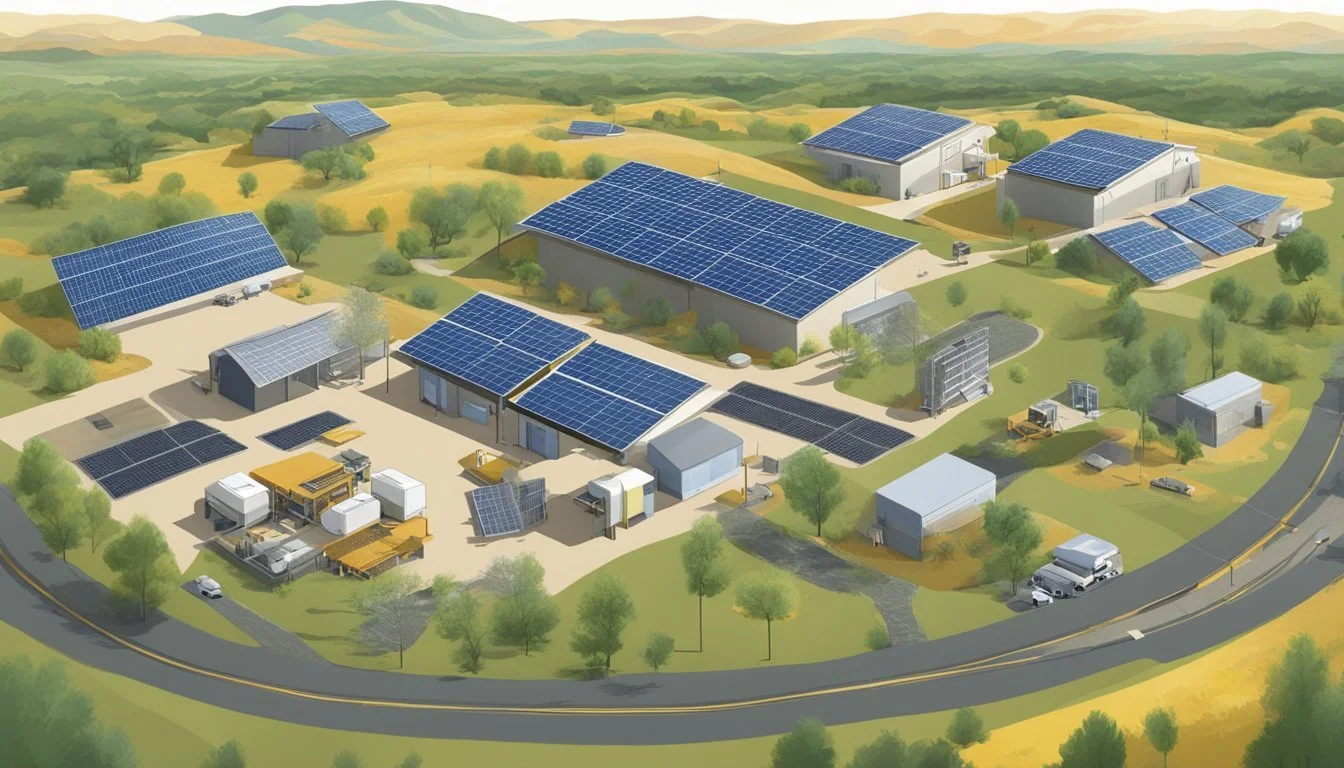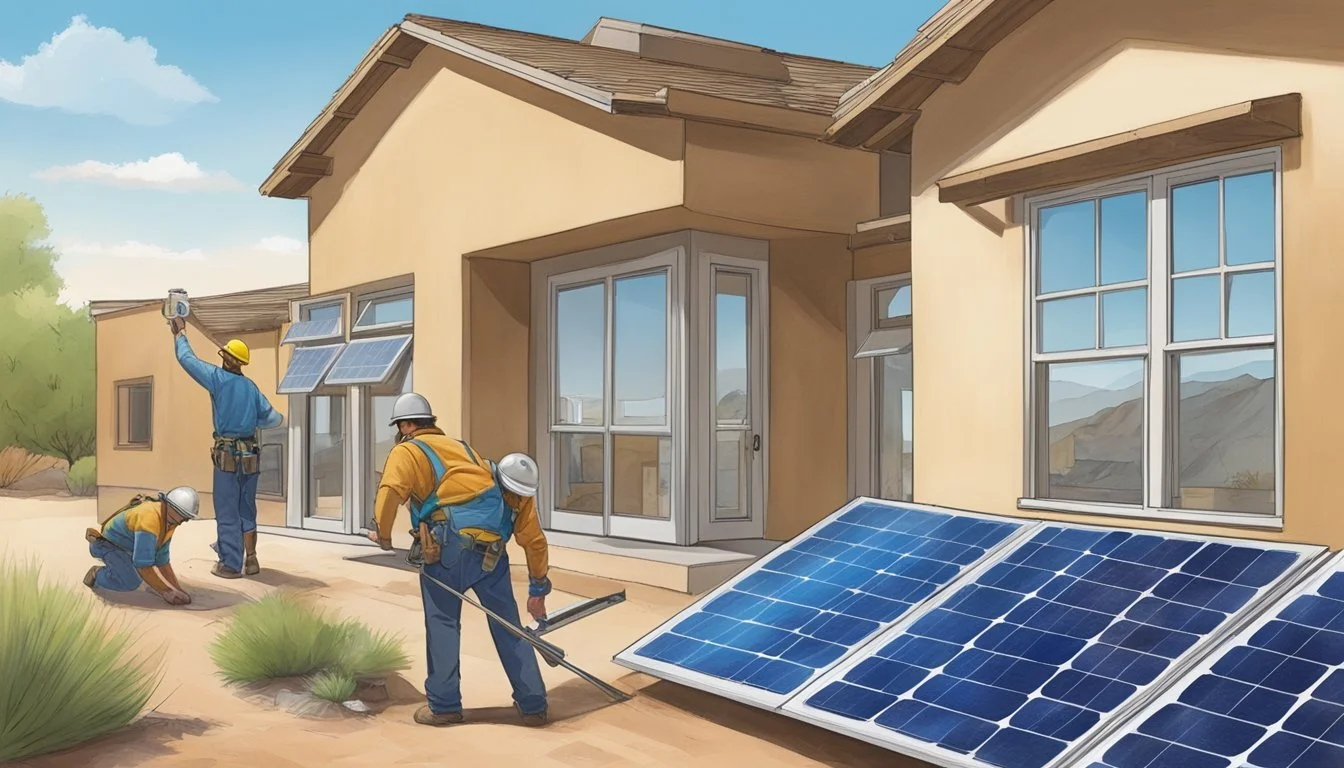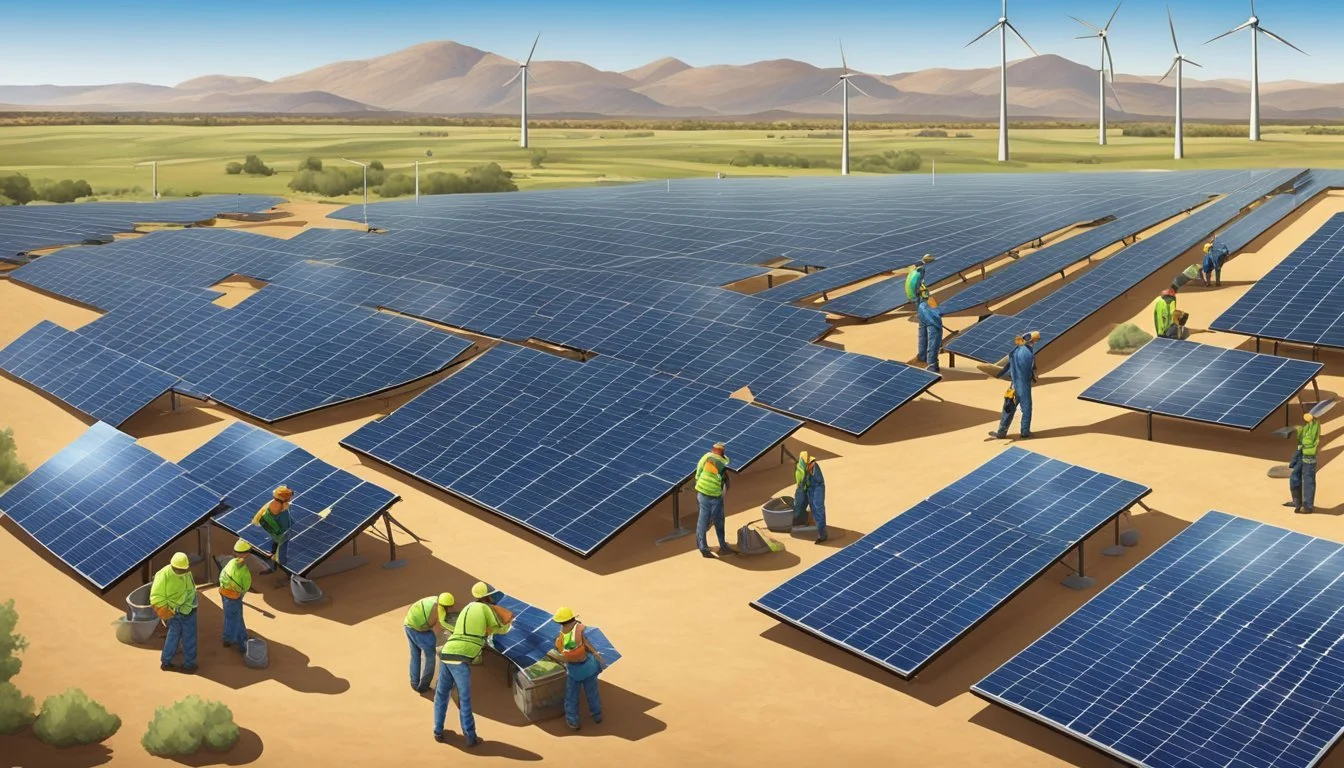Incentives for Renewable Energy and Conservation in New Mexico
Key Programs and Benefits
New Mexico has established a proactive stance in encouraging the adoption of renewable energy sources and the implementation of energy conservation measures. With ample sunshine and a commitment to a sustainable future, the state provides a range of incentives aimed at fostering the use of solar power and other renewable resources. These incentives not only support the environment but also offer financial benefits to the individuals and businesses that partake in them.
The state government offers multiple financial incentives to encourage taxpayers to transition to renewable energy solutions, including solar energy systems. Programs such as the Solar Market Development Tax Credit and the Sustainable Building Tax Credit are designed to ease the financial burden of investing in renewable technology. These measures not only contribute to a reduction in the state's carbon footprint but also serve to promote local industry growth within the realm of renewable energy.
In tandem with these financial incentives, New Mexico's focus on energy conservation is reflected in initiatives that enhance grid modernization and efficiency. Grant programs that began in 2021 are underpinning efforts to integrate renewable energy onto the grid, aiming to improve grid reliability and security, while increasing customer service and energy-saving capabilities. Through these integrated strategies, New Mexico is forging a path toward a more renewable and energy-efficient future, benefiting both the economy and the environment.
Renewable Energy Landscape in New Mexico
In New Mexico, the push towards renewable energy sources is significant, harnessing solar, wind, and biomass resources to address energy needs and climate change.
Significance of Renewable Resources
New Mexico's commitment to renewable resources is evident in its legislative initiatives aimed at reducing the impact of climate change. It has established measures to facilitate the large-scale adoption of renewable energy sources, aiming to improve grid reliability and security through modernization efforts. Programs like the grid modernization grant help pilot projects that increase the utilization of renewable resources such as solar power on the state's grid.
Current Renewable Energy Production
New Mexico has embraced its natural assets for energy production, tapping into the ample sunlight and steady winds characteristic of the region. As of 2022, the average solar panel cost reflects the region's investment in solar capacity, with installations providing an essential component of the state's renewable energy portfolio. Moreover, utility-scale renewable energy developers are attracted by incentives like the sunset Renewable Energy Production Tax Credit, which facilitated economic development and assisted in meeting state Renewable Portfolio Standard (RPS) requirements.
Energy, Minerals and Natural Resources Department
The New Mexico Energy, Minerals and Natural Resources Department plays a crucial role in managing the state's natural resources and energy policy. They oversee initiatives to increase energy efficiency and promote renewable energy sources, such as solar and wind power. The department's actions reflect a transition to a more sustainable energy future, underscored by a significant legislative move—passing a 100% Clean Energy Bill—which establishes ambitious goals for a carbon-free electricity generation by 2045.
Incentive Programs and Tax Credits
New Mexico offers a range of incentive programs and tax credits to encourage renewable energy production and sustainable building practices. These financial benefits are designed to reduce personal income tax obligations and promote investment in clean energy technologies.
Federal Solar Tax Credit
The Investment Tax Credit (ITC), commonly known as the Federal Solar Tax Credit, allows for a deduction of a percentage of the cost of installing a solar energy system from federal taxes. The credit adds significant value to solar investments and is available for both residential and commercial properties.
Solar Market Development Tax Credit
The Solar Market Development Tax Credit, specific to New Mexico, offsets personal income taxes for residents who invest in solar photovoltaic (PV) systems. This credit is pivotal for the growth of solar energy in the state, ensuring more affordable access to renewable technologies.
Renewable Energy Production Tax Credit
New Mexico's Renewable Energy Production Tax Credit (REPTC) incentivizes wind and biomass projects with a one cent per kilowatt-hour (kWh) tax credit and solar with an average of 2.7 cents per kWh. This program, administered by the New Mexico Energy, Minerals and Natural Resources Department, aims to elevate the state's renewable energy portfolio.
Sustainable Building Tax Credit
Encouraging green construction, the Sustainable Building Tax Credit rewards builders and developers who achieve high standards of energy efficiency and sustainability in their projects. This credit directly responds to legislative efforts to promote eco-friendly building across New Mexico, offering financial incentives to support this vital industry shift.
Energy Efficiency and Conservation
In New Mexico, incentives for energy conservation and efficient use of resources play a pivotal role in advancing the state's clean energy goals. These initiatives are particularly evident through the efforts of the state's Energy Conservation and Management Division (ECMD), as well as various rebates and programs designed to promote the adoption of energy conserving products.
State Energy Conservation and Management Division
The ECMD operates as the central hub for New Mexico's efforts in energy efficiency and conservation. It provides strategic oversight and implements policies designed to reduce energy consumption. Among its responsibilities, the ECMD encourages the use of clean energy technologies, such as heat pump water heaters, that contribute to the state’s energy sustainability.
Energy Efficiency Resources and Rebates
Residents have access to numerous resources aiding in the reduction of energy use. Specifically, financial incentives, like rebates, make it more affordable for homeowners to adopt energy-efficient appliances. Programs exist that help individuals invest in energy conserving products, ensuring that the transition to energy efficiency is both economically and practically viable.
Energy Conservation Programs
Diverse energy conservation programs within New Mexico provide not only incentives but also education on the benefits and application of energy-efficient solutions. These programs support the integration of renewable energy systems and emphasize the importance of behavioral changes to foster a culture of conservation across various sectors of society.
Financial and Technical Support for Renewable Energy
New Mexico offers a variety of financial incentives and technical support services to promote energy efficiency and the adoption of clean energy. These resources are designed to lower the barriers for residential and commercial entities looking to implement renewable energy solutions.
Grants and Funding Assistance
Grants and financial aid play a crucial role in New Mexico's strategy to encourage the development of renewable energy. Entities can explore a range of incentives such as rebates, tax credits, and low-interest financing programs. These financial mechanisms are specifically aimed at reducing the initial capital required for renewable energy projects and energy efficiency upgrades. New Mexico's residents and businesses can access financial incentives via various programs that are updated periodically to reflect the state's commitment to clean energy transitions.
Tax Credits: Significant tax credits are available for solar photovoltaic (PV) systems, solar thermal installations, and other renewable energy systems.
Rebate Programs: Rebates may be offered by local utilities for the installation of energy-efficient appliances and renewable energy systems.
Technical Support Services
Beyond financial assistance, New Mexico provides valuable technical support services. These services facilitate the understanding, development, and implementation of renewable energy projects by offering guidance and expert advice. Stakeholders have access to an online portal packed with resources including detailed information on policies, and they can sign up for webinars and workshops.
Advice and Consultation: Specialists provide insights on best practices, system design, and integration with existing infrastructure.
Education and Training: Webinars and workshops educate stakeholders on the latest technologies and advancements in renewable energy.
By leveraging both grants and technical expertise, New Mexico supports its citizens and businesses in navigating the journey toward a cleaner and more sustainable future through the use of renewable energy and energy efficiency improvements.
Construction and Renovation Incentives
New Mexico offers a range of incentives aimed at promoting sustainable building practices in both renovation and new construction projects. These initiatives are designed to encourage the adoption of energy-efficient measures in the commercial sector and ensure that new construction projects meet or exceed contemporary energy standards.
Commercial Renovation Subsidies
Commercial entities in New Mexico can access subsidies to assist in offsetting the costs associated with retrofitting and renovating buildings to achieve improved energy efficiency. Subsidies often cover a portion of expenses related to the installation of energy-efficient windows, insulation, and HVAC systems. Eligible projects typically focus on reducing the overall energy consumption and incorporating sustainable building practices.
New Construction Energy Standards
New construction projects in New Mexico are required to adhere to strict energy standards that promote sustainability and energy conservation. These standards include the integration of renewable energy sources and high-performance building materials. Builders are incentivized to go beyond the minimum requirements through tax credits and rebates when they implement advanced sustainable technologies and designs in their construction plans.
Impact on Jobs and the Economy
In New Mexico, the evolving landscape of renewable energy and conservation is recalibrating the job market and stimulating economic expansion.
Renewable Energy Sector Employment
The rise in renewable energy projects across New Mexico has led to a significant surge in employment within the sector. Specifically, the solar photovoltaic (PV) market has been a considerable employer, given the state's abundant sunshine. Incentives like the Investment Tax Credit (ITC) have only accelerated job creation, enticing companies to set up operations and hire locally. Lawmakers during the legislative session continually push for policies that further expand these job opportunities.
Economic Growth Driven by Clean Energy
Economic development from clean energy in New Mexico is not just a future aspiration but a current reality. Investments in renewable sources are bolstering the state's solar market development, with long-term benefits that include increased tax revenues and diversified local economies. The direct impact of these policies and investments by legislators is visible as new companies enter the market, providing a robust economic stimulus and positioning New Mexico as a leader in clean energy.
Regulatory Framework and Legislation
New Mexico's approach to promoting renewable energy and conservation is underpinned by robust legislative actions and regulatory frameworks. These legal structures are designed to facilitate energy transition, guide utility companies, and set forth rules for both energy producers and consumers.
Energy Transition Act
The Energy Transition Act (ETA) represents a cornerstone of New Mexico's environmentally progressive policies. It mandates that public utilities transition to 50% renewable energy by 2030 and 80% by 2040. The law emphasizes the state's commitment to reducing carbon emissions and supporting clean energy technologies.
Net Metering Policies
Net Metering Policies in New Mexico allow residential and commercial customers who generate their own electricity from solar power to feed excess energy back into the grid. Utilities credit the value of the excess power to customers' bills, encouraging the adoption of renewable installations by offsetting costs.
Local Regulations and Compliance
Municipalities in New Mexico enforce Local Regulations and Compliance measures pertinent to renewable energy. These local statutes work alongside state laws, ensuring that utility companies and energy developers adhere to building codes, zoning laws, and environmental standards unique to each locality.
Socio-Environmental Benefits
Renewable energy initiatives in New Mexico not only foster cleaner power generation but also catalyze socio-environmental progress. They significantly reduce greenhouse gas emissions and provide educational platforms for communities on sustainability practices.
Health and Environmental Advantages
Renewable energy sources, such as those from New Mexico's plans to harness solar energy, directly correlate with reductions in air pollution. This transition from fossil fuels leads to better air quality which, in turn, contributes to healthier communities. Reductions in greenhouse gas emissions are integral to mitigating climate change impacts, which can include extreme weather conditions and threats to public health and safety. Investments in renewable energy also show commitment to safeguarding natural habitats and ecosystems, vital for maintaining biodiversity.
Community Engagement and Education
The drive towards renewable energy in New Mexico is a collaborative effort involving various sectors of society. Initiatives like the grid modernization projects stimulate community engagement by involving them in the adoption of renewable resources. Moreover, educational efforts, such as those conducted by The Nature Conservancy, are paramount. They aim to empower state leaders and citizens with knowledge, motivating them to actively participate in clean energy dialogues and actions. Education around sustainability practices coupled with actual implementation reinforces community solidarity and resilience against environmental challenges.
Future Developments in Renewable Energy
New Mexico is poised to witness significant advancements in renewable energy, particularly in solar and wind technologies, alongside modernization efforts to upgrade the grid infrastructure. These developments aim to harness the state's abundant natural resources more efficiently and support its transition to a cleaner energy future.
Advancements in Solar Technology
In New Mexico, solar energy advancements are particularly focussed on improving photovoltaic systems. Technologies such as solar thermal are being enhanced to increase energy conversion efficiency. Research in advanced energy materials aims to produce solar panels that are not only more efficient but also less expensive and more durable.
Emerging Trends in Wind Energy
Wind power in New Mexico is also on an upward trajectory, with innovations focusing on larger, more effective turbine designs that could capture wind energy even at lower wind speeds. These trends are vital for New Mexico's rural and semi-arid regions where wind farms can be optimally placed to contribute to the state's energy portfolio.
Grid Modernization Initiatives
Efforts in grid modernization include integrating smarter, more advanced energy storage solutions to accommodate the variable nature of solar energy and wind power. This involves sophisticated software and hardware that can predict energy supply needs, balance the grid's load, and prevent outages, ensuring that renewable energy is not just generated but also delivered reliably and efficiently to New Mexicans.







